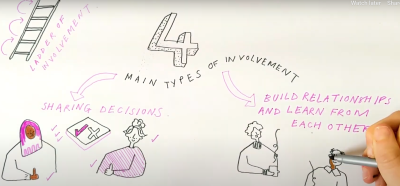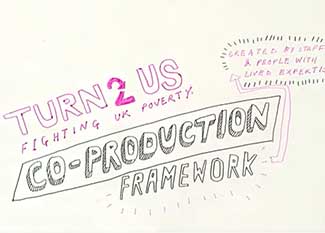Co-Produce with us
We work with people with lived experience of not having enough money to live on to design, deliver and evaluate our work.

What is co-production?
Co-Production is working alongside people with lived expertise to design and deliver services that affect them.
Why do we co-produce?
We co-produce our work, so that we learn from one another, and so that we can combine the power of Turn2us with the collective power of people with lived experience.
Our co-production framework
Our approach to co-production and involvement is explained fully in our framework.
We created our co-production framework following the 4pi National Standards on Involvement from the National Survivors User Network, the UK's only mental health charity who centre the survivor and lived experience voice.
Download our Co-Production framework (PDF, 806KB).
Watch our short video below

Here at Turn2us we work in co-production with people with a lived experience of financial hardship. This video will go over key aspects of our co-production framework, which sets out our approach. The framework was created by staff and people with lived expertise.
At Turn2us we define co-production as working alongside people with lived expertise to design and deliver services that will affect them. We refer to people with lived expertise as co-production partners. There are four main types of involvement that we use at Turn2us, which are based on Shelley Einstein's popular 'ladder of involvement'. The main differences between the four types of involvement are based on two factors; one, the extent to which Turn2us shares decision making with co-production partners and two, the extent to which we build relationships and learn from each other.
The four main types of involvement are: co-production, co-design, engagement and consultation. Each of these approaches either strengthens decision-making through diverse thought, shares power with those who the project is for or gathers a representative of the views of those for who the project is for. An example of co-production could be designing and creating a new grant fund together. An example of co-design could be redesigning the benefits calculator. An example of engagement could be contribution to an internal document. An example of consultation could be large-scale surveys.
We co-produce our work so that we learn from one another and so that we can combine the power of Turn2us with the collective power of people with lived expertise.
Firstly, we co-produce our work so that we can learn from one another. When we learn from one another through an ongoing and two-way process we can more deeply understand what information and support people need. We can also understand how Turn2us is best able to support people. This helps Turn2us to meet its strategic purpose of giving people the information and support they need and helps us to increase the effectiveness and impact for people who use our services.
Secondly, we co-produce our work so that we can combine our different sources of power. By combining the power of our professional knowledge and capabilities with our lived experience and expertise, we increase our ability to meaningfully tackle the causes and symptoms of poverty. We also strengthen our collective ability to challenge the systems which trap people in poverty. This helps Turn2us to meet its strategic purpose of collaborating to tackle the causes and symptoms of poverty. By collaborating and combining the power of Turn2us as an organization with the power of people with lived experience of poverty, we will increase our chances of tackling the causes and symptoms of poverty.
The four main principles that will guide our co-production work are: working in safe spaces, making our work actionable, transparent and accountable, being inclusive and equitable, and responding to the adaptable nature of co-production. Psychological safety is crucial to effective co-production because without it people may not feel that they can share their lived experiences with us.
Moreover, if people feel they can speak openly we mitigate against issues of harm going unreported. Making our work actionable, transparent and accountable is critical for quality co-production as it means there is a purpose and integrity to our work. Without it we risk wasting resources and people's valuable time. Our work must be inclusive and equitable. If we do not approach co-production with an awareness of the structural oppression of minority groups, we accept that system. It is important for us to remember that co-production is an evolving concept for Turn2us and we need to be flexible as we grow into an organization where it is an embedded practice.
For the full version of our co-production framework please go to our website.
Get involved
We are always looking for more people with lived experience of financial insecurity to co-produce with.
If you’d be interested in working with Turn2us in the future, please send an email to getinvolved@turn2us.org.uk, to let us know.
Working on the impact and programmes group gave me the confidence to apply for employment and I am now working for the first time in six years.

Hear more from our Co-Production Partners
Read testimonials, poems and blogs from Turn2us co-production partners.
Our experiences of co-production
Hear from Turn2us staff members and Co-Production Partners on their experiences of designing, delivering and evaluating services together.